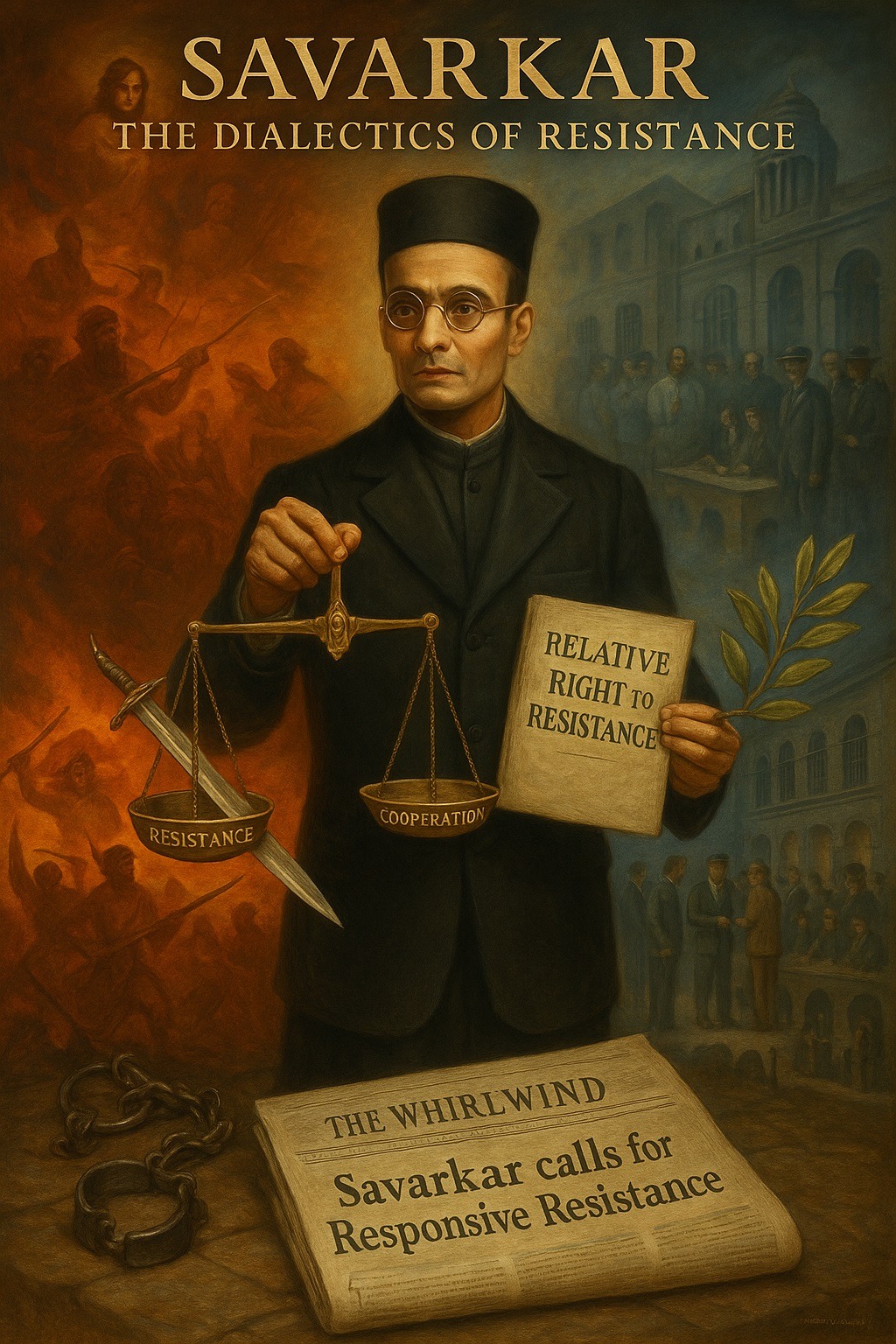Political Dimension of Hindutva, Part 6
The Concept of “Responsive Resistance”
Vinayak Damodar Savarkar was deeply influenced by the idea of “Responsive Resistance,” a term coined by Bal Gangadhar Tilak. This concept proposed that Indian cooperation with British colonial rule should be directly proportional to the level of political reforms granted by the British. More reforms would encourage Indian support, while fewer reforms would lead to mass unrest and insecurity for British officials.
Engagement with Resistance and Passive Resistance
Veer Savarkar explored different forms of resistance during his time in France and London. He studied historical movements, including the 1907 struggle of French winemakers, and analyzed the concept of passive resistance. He acknowledged the limitations of passive resistance, recognizing that those in power often relied on violence rather than principles of justice.
His time in the Andaman Islands as a prisoner gave him firsthand experience with resistance. Prisoners there engaged in non-cooperation, refusing hard labor to protest harsh conditions. While Savarkar did not openly participate, his writings reflect a deep engagement with this idea.
The Middle Ground Between Resistance and Cooperation
Savarkar was critical of strikes as a form of resistance, believing that risking lives for minor issues detracted from the larger goal of independence. He also feared it would deprive nationalists of their right to fight for freedom. He sought a middle path between resistance and cooperation, balancing immediate struggles with long-term national goals.
The “Relative Right to Resistance”
A crucial element of Savarkar’s political thought was his concept of resistance. Instead of granting individuals an absolute right to overthrow the state, he advocated a “relative right to resistance.” This meant that while the system itself remained intact, incompetent leaders could be replaced. He cited Arya Chanakya (Kautilya) and his assassination of Mahapadmanand (Nanda) as an example of justified resistance when national security and progress were at stake.
Resistance Against Compatriots: The 1857 Uprising
In The Indian War of Independence of 1857, Savarkar argued that Indian princely states had a duty to support revolutionaries. However, many rulers prioritized personal gain over national welfare. He implicitly justified the revolutionaries’ right to seize resources from these rulers to fund the independence struggle. He also emphasized that Hindu rulers had failed to support the pan-Hindu movement as effectively as their Muslim counterparts had supported the pan-Muslim cause. For Savarkar, coercion was a legitimate means to rectify this imbalance.
Tyrannicide and the Justification of Political Assassinations
The right to resistance remained central to Savarkar’s political ideology until his death. In Six Glorious Epochs of Indian History, he defended tyrannicide under specific conditions. He cited the assassination of Brihadratha Maurya by his general, Pushyamitra Shunga, as an example of justified political change. Savarkar interpreted this event as a return to the “Vedic religion,” portraying Pushyamitra’s actions as a “national duty”. This interpretation suggests that Savarkar not only justified resistance against tyranny but also advocated for the suppression of state-supported Buddhism.
Final Thoughts -The Dual Path of Resistance
Savarkar’s political philosophy was deeply rooted in the idea of resistance, albeit with strategic limitations. He balanced passive and active resistance, advocating for a “relative right to resistance” that allowed for the removal of incompetent leaders while maintaining the state structure. His views on revolutionary actions, political assassinations, and the role of Hindu rulers reflect his broader vision of national revival and independence. Whether one agrees or disagrees with his ideas, his writings remain a crucial part of India’s historical discourse on resistance and political struggle.
What are your thoughts on Savarkar’s concept of ‘Responsive Resistance’ against the British oppressors? When is violence in politics justified—if ever? Which is more powerful—passive resistance or active revolt? Can history justify political assassinations today? Share your insights in the comments below!
Sources:
GODBOLE, Vasudev Shankar. 2004. Rationalism of Veer Savarkar. Itihas Patrika Prashan: Thane/Mumbai.
SAVARKAR, Vinayak Damodar. 1950. The story of my transportation for life. Sadbhakti Publications: Bombay.
SAVARKAR, Vinayak Damodar. 2007. Hindu Rashtra Darshan. Bharat Bhushan. Abhishek Publications: New Delhi.
SAVARKAR, Vinayak Damodar. 1970. The Indian war of Independence 1857. Rajadhani Granthagar: New Delhi.
SAVARKAR, Vinayak Damodar. 1971. Six glorious (golden) epochs of Indian history. Savarkar Sadan: Bombay. 1971.


Leave a Reply